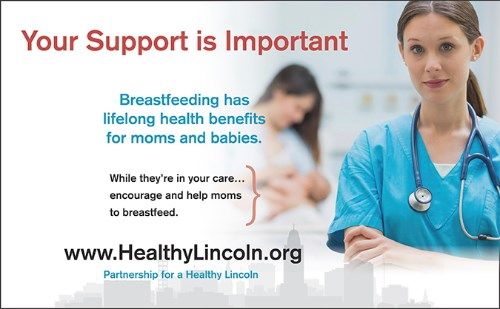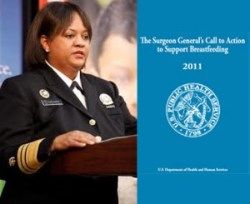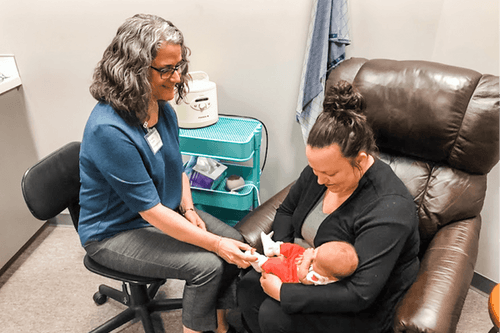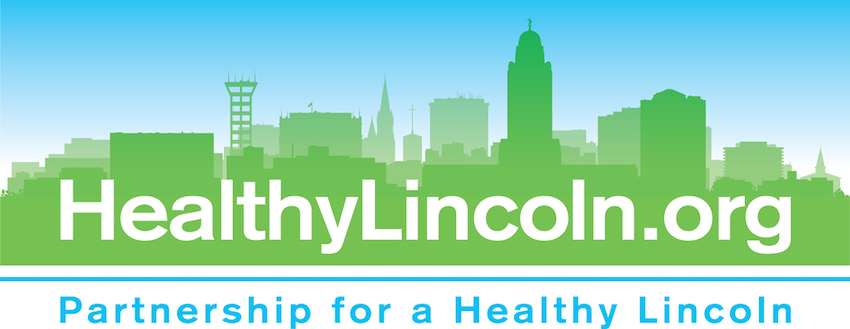Quick links:
Recommendations How to Support Breastfeeding Skin to Skin
Baby Friendly Practices Community Resources
Importance of Healthcare Provider
Support of Breastfeeding

Physicians and health care providers have a unique role in promoting breastfeeding and supporting a woman’s decision to breastfeed. This support begins during preconception care and continues through prenatal care, delivery, postpartum care, and during ongoing care of the infant, woman and the family. A study in Pediatrics concluded clinicians’ practices regarding formula supplementation of healthy infants and their opinions about the importance of their breastfeeding advice are associated with the likelihood that mothers will continue exclusive breastfeeding. Your encouragement matters.

Current Recommendations
In 2011, the US Surgeon General issued a national Call to Action to Support Breastfeeding. This report recommends widespread community efforts to create a supportive environment for new mothers in order to increase breastfeeding rates and improve the health of the nation. The American Academy of Pediatrics and the American Academy of Family Physicians were joined in February 2016 by the American College of Obstetricians and Gynecologists in recommending babies be exclusively breastfed for the first 6 months, with continued breastfeeding as complementary foods are introduced through the infant’s first year of life or longer as mutually desired by mother and infant.
Local Data
Centers for Disease Control and Prevention (CDC) Data – Nebraska
- According to the 2022 Center for Disease Control and Prevention Breastfeeding Report Card, national data shows that among infants born in 2019, most (83.2%) started out receiving some breast milk. At 1 month, 78.6% were receiving any breast milk. At 6 months, 55.8% of infants received any breast milk, and 24.9% received breast milk exclusively. Statewide NPQIC (Nebraska Perinatal Quality Improvement Collaborative) breastfeeding initiation remained steady at 89% in 2024, while exclusive breastfeeding rates decreased to 62%.
Local Hospital Tracking-Lancaster County
- According to data from the two maternity care hospitals in Lincoln, 91% of moms intend to breastfeed.
Local Women, Infants and Children (WIC) Data – Lancaster County
- Most recent data (Oct. 2020 through Sept. 2021) show that 82.4% mothers in the WIC program began breastfeeding, but by 6 months, only 26.0% were still breastfeeding.

Dr. Kathy Leeper, breastfeeding medicine specialist, and patient at MilkWorks
In Support of Breastfeeding
Studies show that physician encouragement and support of breastfeeding positively impacts a mother's choice to breastfeed. To support and encourage breastfeeding, physicians and health care providers need to:
- Understand the benefits of breastfeeding (Source: US Dept of Health and Human Services)
For baby: Reduced risk of SIDS, ear infections, upper respiratory infections, childhood leukemia, obesity, diabetes, gastrointestinal issues, asthma, childhood obesity and more
For mom: Reduced risk of breast cancer, ovarian cancer, type II diabetes, and postpartum depression - Understand the physiology of lactation and how to identify women at risk for lactation problems or with contraindications
- Prescribe breastfeeding - Recommend your pregnant patients breastfeed their babies (view or download this pdf)
- Identify potential barriers and solutions, resources, and local lactation counseling services
- Encourage all staff and clinicians to be trained on Lincoln community standards for breastfeeding support
- Lincoln Community Breastfeeding Initiative Breastfeeding Support Packet
- Shared Community Breastfeeding Standards Between Lincoln Hospitals
- Key Prenatal Shared Teaching Concepts
- Key Postpartum Teaching Concepts
- Physicians Guide to Breastfeeding
- Provide a list local of breastfeeding resources to pregnant/new moms in waiting rooms, in exam rooms and for pregnant/new moms to take home

- Encouraging Skin to Skin
Know the benefits of skin to skin (The Sacred Hour: Uninterrupted Skin-to-Skin Contact Immediately After Birth, Raylene Phillips MD, IBCLC, FAAP, NAINR. 2013) and talk to your patients about it. Early postpartum skin-to-skin contact increases:
- Physiologic stability
- Promotes optimal psycho-emotional well-being
- Supports structural and functional infant brain development
If there are no medical contraindications, immediate and uninterrupted skin-to-skin contact can be possible in the operating room following a cesarean birth as well. Facilitating Skin-to-Skin Contact in the Operating Room After Cesarean Births

- Provide ongoing support
Continue to encourage breastfeeding moms to build self-efficacy
- Baby-Friendly Practices
- prescribe breastfeeding
- no formula samples
- provide local resource guide prenatally
- talk to moms at every visit
about breastfeeding
- talk to moms/provide resources on the
importance of skin to skin contact,
- advocate for skin to skin at birth
- wait on the weight
Local Community Resources
MilkWorks - MilkWorks is a non-profit, community breastfeeding center with offices in Lincoln, and Omaha, Nebraska. Under the medical direction of Kathy Leeper, MD, IBCLC, the center provides a wide range of education, support and clinical services to help mothers breastfeed their babies. No mother is denied services based upon ability to pay. MilkWorks also provides oversight, mentoring, training, and support for the Community Breastfeeding Educators (CBEs). Currently, 37 CBEs offer peer counseling in 27 languages. Download a CBE brochure.
LLCHD - WIC - The Women, Infant, and Children program (WIC), part of the Lincoln Lancaster County Health Department, provides nutrition and health services, and breastfeeding information and support for families with low to moderate income. The program includes peer counselors to support breastfeeding and postpartum women in English and Spanish.
LLCHD Family Connects Program Family Connects is a universal newborn home visiting program in Lincoln-Lancaster County that provides a home visit by a Registered Nurse following your hospital stay. All families with a newborn who live in Lancaster County are eligible for a Family Connects visit. Nurse visits occur 3 weeks after baby is born and provide education and guidance about topics relevant to all newborns and maternal needs, including breastfeeding and postpartum support. Home visitation services are provided in the home or at another location in the community.
Family Service – WIC - Family Services Women, Infants, and Children Nutrition Program provides free food, nutrition information, and breastfeeding support to help keep pregnant women, infants and children under five healthy and strong - for families with low to moderate income. Family Services WIC also has peer counselors to support women on their breastfeeding and postpartum journey.
Nebraska Breastfeeding Coalition - The Nebraska Breastfeeding Coalition (NBC) is a network of individual members and organizational partners dedicated to improving the health of Nebraskans by making breastfeeding the norm through education, advocacy and collaboration. The coalition works together to share information and partner in activities to increase breastfeeding rates across the state. Visitors to their website can also search for a lactation consultant nearest them.
Malone Community Center - The Malone Center serves Black, Indigenous and other families of color through a variety of services and outreach. Malone’s Melanin Mommas Support Group, Melanin Dads and Partners Support Group and Breastfeeding Peer Counseling programs include emotional support, lactation assistance, patient advocacy, education, virtual support, 1:1 support in the home and office, delivery of essential supplies, and group events to develop a strong support network for women and families. They also offer a variety of breastfeeding education courses, taught 1:1 or in group settings led by an International Board Certified Lactation Consultant.
Asian Community and Cultural Center - The Asian Center provides services and programs serving immigrant and refugee families in Lincoln. The center has onsite Community Breastfeeding Educators and provides breastfeeding education and information in several languages for mothers and families new to America from Asian, African, and Middle eastern countries at the center, within their community or homes of the families they serve.
El Centro de las Americas - El Centro provides services in the areas of education, family support, youth empowerment, health, and resource navigation for Lincoln’s Hispanic/Latino community. The center has an onsite Community Breastfeeding Educator and provides breastfeeding education and information in English and Spanish at the center and within the community or homes of the families they serve. Informacion de Amamantar en Espanol.
Lincoln Family Medicine Center - Lincoln Family Medicine has an onsite Community Breastfeeding Educator and provides breastfeeding education and information in English and Spanish at the center.







